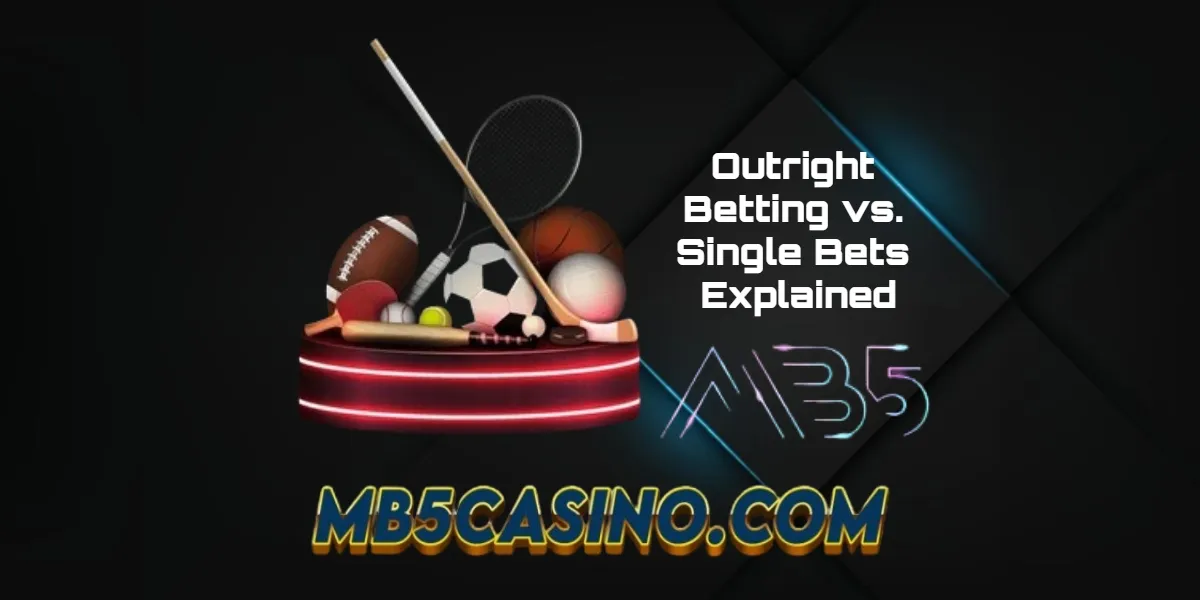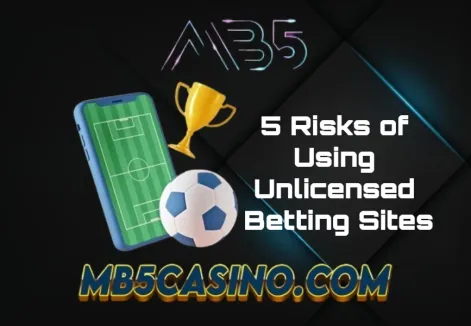The world of sports betting offers a diverse and engaging experience, allowing participants to wager on everything from the outcome of the next play to who will lift the trophy at the end of a six-month season. At the heart of this variety are two fundamental categories of wagers that define the scope and timeline of the bet: Outright Betting and Single Bets. While both aim to predict an outcome, their time horizons, potential returns, inherent risks, and strategic demands are vastly different. Understanding the distinctions between these two types is critical for any bettor looking to manage their bankroll effectively and align their wagers with their knowledge and patience.
Defining the Scope: Outright vs. Single Wagers
The most significant difference between outright and single bets lies in the scope and timeline of the event being wagered upon.
The Single Bet: Short-Term Focus
A Single Bet, often referred to as a Straight Bet or Match Bet, is a wager placed on the result of a single, specific game, match, or individual event. It is the most common and fundamental type of sports wager. The outcome is typically known within a few hours, or minutes, of the event's conclusion.
Key Characteristics of Single Bets
The timeline is short-term, lasting from minutes to hours. The focus is the binary or tri-nary outcome of one contest, such as Team A wins, Team B wins, or Draw. Common markets include Moneyline (who wins outright), Point Spread (win/lose by a margin), and Totals (Over/Under a combined score). The risk is limited to the variables of a single contest, such as individual player performance, temporary injuries, or coaching decisions. Settlement is quick, with funds settled immediately after the game ends.
For example, betting on the Paris Saint-Germain to beat Lyon in their next Ligue 1 fixture is a single bet. Your money is tied up only for the duration of that game, and your return is based on the single-game odds.
The Outright Bet: Long-Term Prediction
An Outright Bet, commonly known as a Futures Bet in North America or an Ante-Post Bet in Europe, is a wager placed on the final outcome of an entire tournament, league, or competition. Instead of predicting one game, you are predicting the champion or the long-term statistical leader.
Key Characteristics of Outright Bets
The timeline is long-term, lasting weeks, months, or an entire season. The focus is the ultimate winner or long-term achievement, such as League Champion, Tournament MVP, or Top Goalscorer. Common markets include Tournament Winner, League Champion, Division Winner, Relegation/Promotion, Top Goal Scorer, or Season MVP. The risk is high, as it's susceptible to a multitude of unpredictable variables over an extended period, such as season-ending injuries, managerial changes, or prolonged dips in form. Settlement is delayed, with funds tied up until the competition concludes.
For example, betting on the Los Angeles Lakers to win the NBA Championship before the season starts, or Rafael Nadal to win the French Open, are outright bets. The fate of your wager is decided only after the final match or race.
Odds and Returns: The Value Equation
The difference in scope fundamentally impacts the odds and, consequently, the potential returns for each type of bet.
Single Bet Odds: Lower Risk, Lower Reward
Single bets typically feature shorter odds for favorites and more modest odds for underdogs. This is because the prediction involves fewer variables. A top team playing a lesser team in a single match has a high inherent probability of winning, reflected by odds like 1.50 (Decimal) or 1/2 (Fractional).
The odds value is generally lower, reflecting a higher probability of the favorite winning a single contest. Odds volatility is less volatile during the event but can shift dramatically in the lead-up due to news, such as a key player being ruled out. For instance, betting $100 on a basketball team at odds of −200 (1.50) yields a profit of only $50.
Outright Bet Odds: Higher Risk, Higher Reward
Outright bets offer much longer odds because the probability of any single team or player succeeding over a long period, against an entire field of competitors, is inherently lower. The odds for even the strongest favorite in a major tournament are often greater than the odds of the same team winning a single, ordinary game.
The odds value is significantly higher, especially for non-favorites (dark horses). Returns of 10/1 ( $10 profit for every $1 staked) or 50/1 are common. Odds volatility is highly volatile throughout the season, shifting dramatically after every major result, injury, or transfer. For instance, betting $100 on an outsider to win the Champions League at odds of 1000 (11.00) yields a profit of $1,000.
Strategic Considerations and Risk Management
The choice between outright and single bets often comes down to a bettor's strategy, risk tolerance, and time horizon.
The Appeal of Outright Betting: The Marathon Strategy
Outright betting is suited for strategic bettors with an in-depth, long-term knowledge of a league or sport.
Advantages
The first advantage is Higher Payouts, where the main draw is the significant return on investment, which can lead to big wins from small stakes if an underdog prevails. Next is Locking in Value, where placing a bet before a season starts, known as Ante-Post betting, allows bettors to lock in high odds on a team they believe is being underrated. If that team performs well early on, their odds will shorten, and the initial bettor retains the better price. There is also Hedging and Cash-Out Flexibility, where as the season progresses and the outright bet looks stronger, many sportsbooks offer a Cash-Out option, allowing the bettor to take a guaranteed profit before the competition is over. Additionally, an outright bet provides Sustained Entertainment, as it keeps a bettor engaged and invested for the entire duration of the competition.
Disadvantages
One of the biggest disadvantages is Tied-Up Money and Opportunity Cost, where your stake is locked away for months. This means you can't use that money for other, potentially profitable, short-term bets. There is also Exposure to Unpredictable Variables, as an outright bet is vulnerable to events over an entire season, such as a star player's season-ending injury, a surprise managerial sacking, or a prolonged dip in form. Furthermore, sometimes No Refund for Non-Runners applies, where in some ante-post markets, if a team or player you back doesn't start the competition, the bet may be considered a loss unless otherwise specified by the bookmaker.
The Appeal of Single Bets: The Sprint Strategy
Single betting is the bread and butter of daily wagering, suited for bettors who prefer frequent action, lower risk, and greater control.
Advantages
Single bets have a Lower Risk Profile, as the outcome is decided quickly, limiting the exposure to long-term variables. You only need the team to perform well for a few hours. This provides Bankroll Flexibility, where stakes are only tied up briefly, allowing the bettor to quickly reinvest winnings or move to the next market, ensuring a high turnover rate of capital. A great advantage is the Statistical Edge, where single bets, especially those involving complex markets like Point Spreads or Totals, allow knowledgeable bettors to find a statistical edge more frequently than in a winner-take-all outright market. Finally, single bets have Wider Market Availability, where almost every game offers dozens of single bet options (e.g., first goalscorer, number of corners, correct score), providing a richer selection than the limited long-term options.
Disadvantages
Single bets have a Lower Payout Potential, where even correctly picking a solid favorite only offers a modest return, requiring larger stakes or higher frequency of winning bets to build a significant bankroll. Moreover, there is No Margin for Error, where unlike outright bets where a team can lose a few games and still win the league, a single bet is instantly settled as a loss if the team fails to win or cover the spread.
What is "outright betting" and how does it differ from a single bet?
Outright betting (often called 'futures' or 'ante-post' betting) is a wager placed on the final outcome of an entire competition, league, or season rather than a single event. It involves predicting the eventual winner, or another long-term result like the top goalscorer, a team to be relegated, or a player to win an MVP award.
Conclusion: Matching Bet Type to Strategy
The choice between Outright Betting and Single Bets is not a matter of one being inherently superior, but rather a reflection of a bettor’s goals.
The Single Bet is the foundation of bankroll growth—a series of calculated, short-term wagers designed for high frequency and controlled risk. It demands excellent short-term form analysis and a keen eye for match-specific value.
The Outright Bet is the lottery of sports betting—a longer shot offering the potential for massive payoffs. It requires patience, a deep understanding of season-long trends, and the foresight to spot an undervalued team or player before the rest of the market catches on.
A well-rounded online betting Malaysia crypto portfolio often incorporates both: single bets for daily action and steady growth, and a small, carefully managed allocation of outright bets to keep the long-term dream of a major payday alive. Ultimately, success in either realm depends on discipline, research, and an unwavering commitment to finding value where the bookmakers have misjudged the true probability.








































